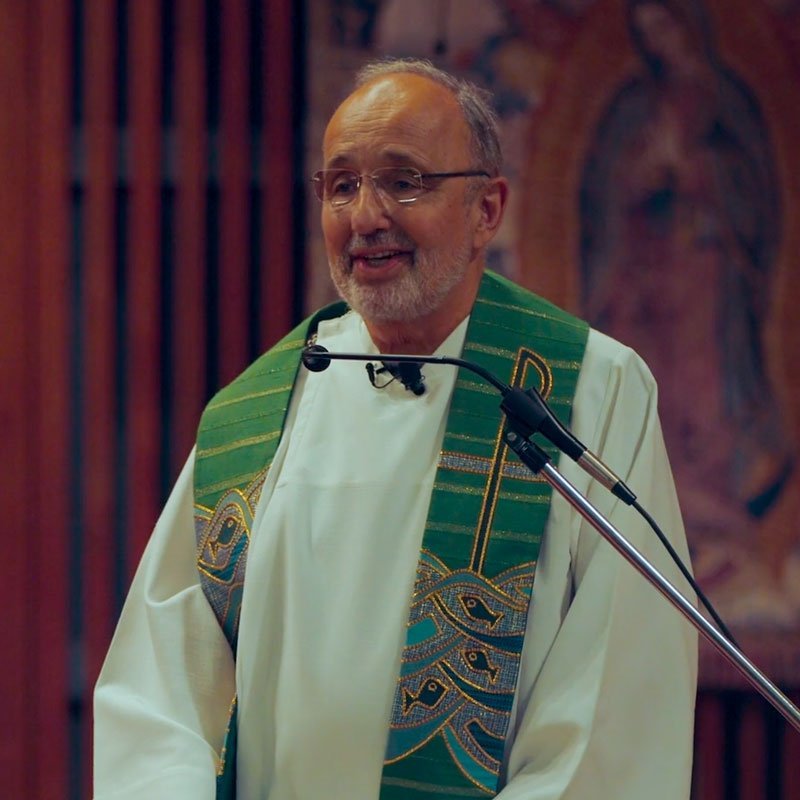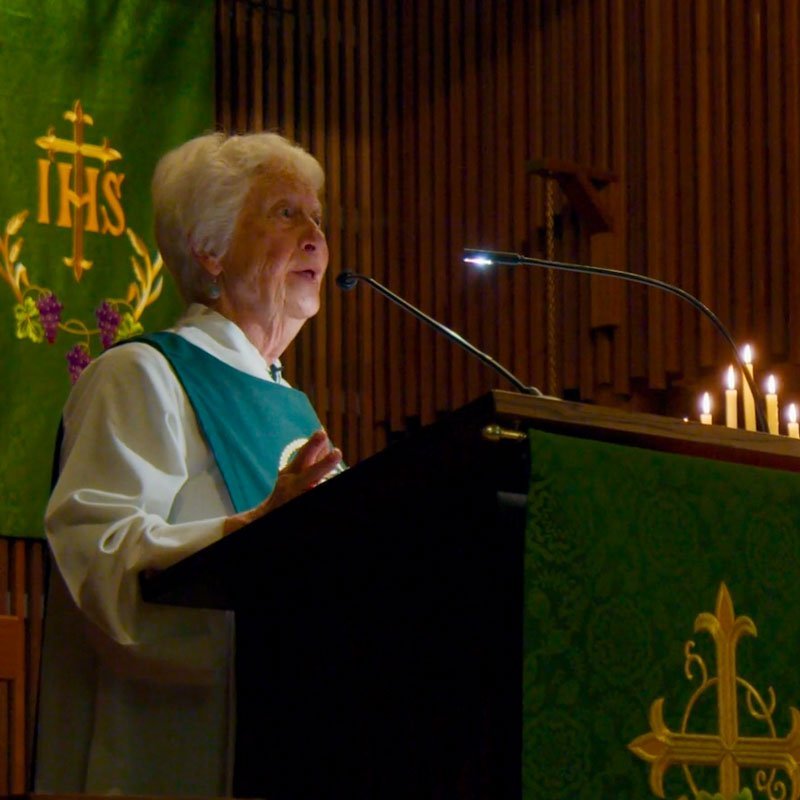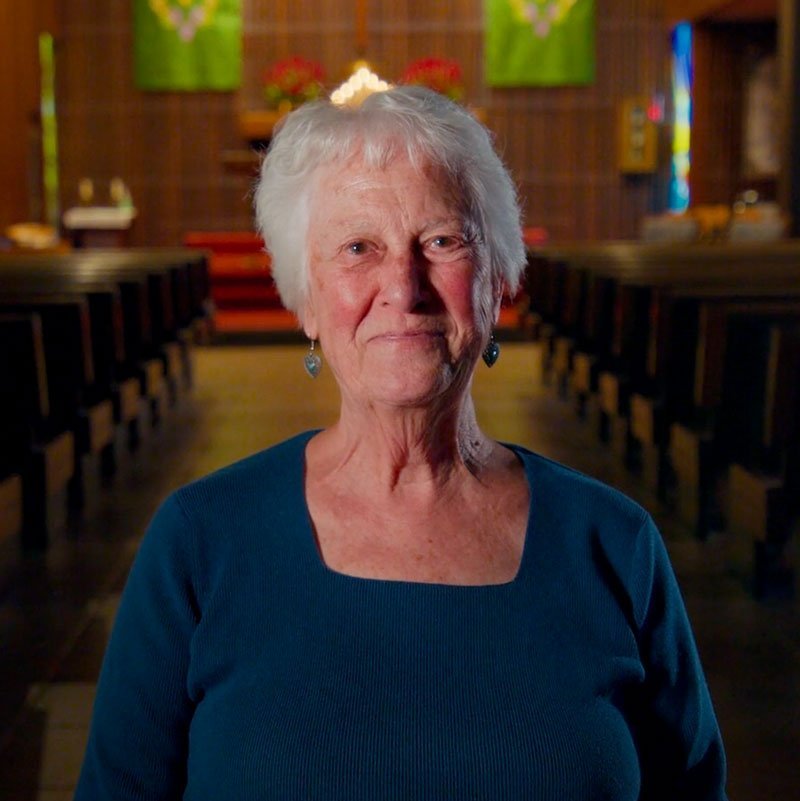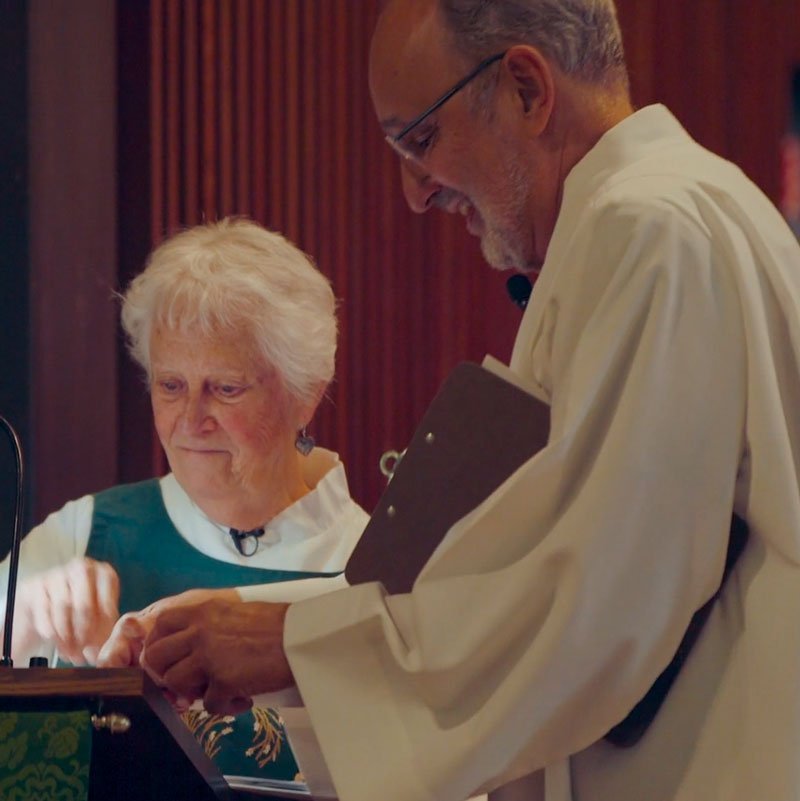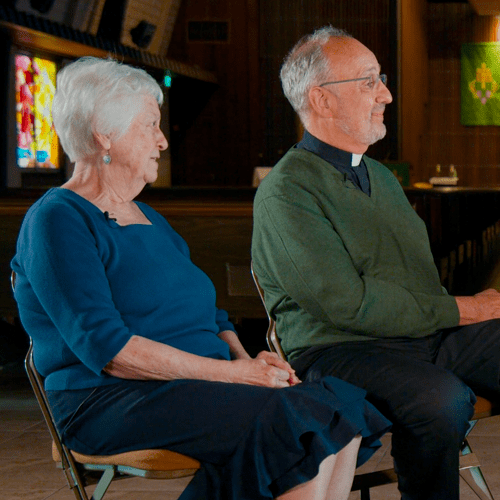Speaker Key
R1: Father Mike Russo
SP = Sister Patricia
FJ = Father Jude
Intro: Good and gracious God, you call us into a future that is unknown and unpredictable, but we know and trust that you are present and faithful to us. We know too that whatever the future brings, it will need merciful, compassionate, peacemaking women and men who hunger for goodness, thirst for justice, and seek truth.
FM: Our preaching journey has taken us to San Francisco, the city by the bay. We will meet Father Jude Siciliano and Sister Patricia Bruno. Both are nationally recognized for their work as Dominican preachers. Their collaborative ministry travels to parishes across the country where they have a hand in developing the next generation of gospel witnesses. We will hear Sister Patricia preach a parish retreat at St. James in Petaluma, north of here in Sonoma County. First, let’s meet Sister Patricia nearby at St. Dominic’s church on Bush and Steiner in San Francisco.
Sister Patricia, good to be with you here at St. Dominic’s. This is an anchor for the Dominican church here in San Francisco?
SP: Yes. Its just a beautiful church as we will see as we walk through it. Part of the reason I think people come here is for the beauty, the acoustics, the music, the preaching, the program. So, its one of the destination churches.
FM: The Dominican Sisters of San Rafael, which you are a member, have done great things in the city. Tell us a little about your work there.
SP: Well, I think probably what’s really proximate to here, to the church, is in ’89 we had the big earthquake here in California. So, our convent and school, the academy—St. Rose Academy—was damaged. So, after that we had to build housing for our sisters. As a congregation, we made a decision that we couldn’t build housing for ourselves if we also didn’t do affordable housing for the city, because you know, housing is really an issue.
FM: Housing particularly here in San Francisco.
SP: Yes.
FM: Let’s take a look more at the church.
SP: Sure.
FM: This is a place of great devotion and I know many of the masses and novenas—people who come here on a continuing basis—tell us a little bit more about the social justice work you have done here in San Francisco.
SP: Well, in our congregation I think has a very strong reputation of doing preaching in many different ways. One of the ways that we preach is through being involved in justice issues. So, we’ve worked in the western addition when it was not so gentrified, and we have taught school here and part of the work that I have done is—I have worked with the North End California Community Loan Fund and did economic development through the religious communities to get finances, to get money from the congregations, as loans for the fund. That money went for low income housing, non-profit agencies, and businesses here throughout northern California.
FM: That’s a great work.
SP: Yes.
FM: Let’s continue down here. I know currently one of the great social justice issues is the children at the border. One of the sisters of San Rafael has done a marvelous piece. Tell us about it.
SP: Sister Joanne is one of our sisters who now is at Lord’s Convent, and for many years she taught art and Dominican College and Dominican University. She did watercolors and her heart really was in the southwest of the United States. So, like many Dominicans or many—all of us who pray, I think—we hold the newspaper in one hand and scriptures in the other and she was reading about the children down on the border and she knew at this stage of her life she couldn’t go there, to be there. As she prayed, she really was moved to do something, and she thought I am an artist. So, she painted watercolors, did watercolors, lovely holy card that’s bigger than usual holy cards, and of our Lady of Guadalupe and some of the children playing around. One has a guitar–. A prayer in Spanish, but then when you turn the card over, its in Spanish and English and a brief history of why she did this.
FM: This has gone national?
SP: Well, just recently because I am not an artist, but I am a preacher. So, I was giving a scripture class over in the east bay—in the Oakland area, and so I was talking to a group of people and I gave them the card, and one of them said I think we should send this to everyone who is in Congress. So, that’s amazing. I called her the other day and said; can you believe this? You know, you are doing this preaching, who would have ever thought?
FM: Well, we will be hearing you preach very shortly in Petaluma. We are going up to Petaluma to meet up with Father Jude Siciliano. Your Dominican team member, and we will be hearing you preach at a prayer service in Petaluma.
SP: Yes, what Father Jude and I do is we do mostly we do parish retreats. We do some teaching of preaching, but we do parish retreats, and we think its really important to have a team, because its important to have men and women and lay people. So, part of the retreat process is that we work with the staff, and we work with members of the parish, so that they—they are involved in the rituals. So, every evening we have a ritual with preaching and music and so what the rituals are often based on maybe bread or symbols that we would be used to. So, water, oil, lent would be crosses or another time might be gifts of the Holy Spirit. So, but to get people involved in it. So, that’s part of the preaching, I think as Dominicans. It’s not just we preach, but we become a community of preachers when we go to a parish.
FM: You have had a collaborative ministry for many years and you are very practiced in preaching. Some call you the best in the country. So, let me ask this very practical question. Obviously, it’s on the mind of Pope Francis, because his very first encyclical letter is about the joy of the gospel, and joy must be a key part of it. Do you have any practical suggestions to preachers and I also get to the point where so many more people—women—youth ministers—have to be empowered. How do you do that?
FJ: There’s a protestant homilitician, Fred Kravic who tells a story about how the Rabbis teach the opening of Genesis. Paraphrased; in the beginning it was chaos, and the spirit of God hovered over the waters. Then, God said let there be light. Kravic, quoting the Rabbis, the Rabbis teach by asking questions. So, the Rabbis ask; before God said let there be light, what was God doing? The Rabbis answered; God was keeping His silence. Out of the silence comes this creative word. So, I would suggest, have suggested as we have had preaching workshops, that the first thing preacher does is to keep the silence. Hear the word, not only from the scriptures, but the newspapers and to keep a silence of some kind. Catechists, theology teachers—keep the silence and then as Kravic says, you break the silence. When you break the silence, something like Genesis—let there be light, and there was light. So, I would make that suggestion to people who are preachers. I think we are very—I know we are very, very busy. We just have a lot of noise in our lives. But, somehow find a silent period to hear the word.
SP: I also think what’s really important because we’ve designed rituals for the evening services. So, they are not a Eucharistic celebration. As Catholics, we are very used to coming to mass, but we are also—we are very open, and I think a lot of our tradition comes from a very rich ritual. So, we have evening services where the community—we train them in doing different things, because its not just the voice, it’s the whole event. So, if I were presiding at mass, which I don’t do, but if I were, I would be sure that everything kind of went together. I mean I don’t mean it has to be perfect. That’s not true, but that its an event. So, the preaching event is part of the whole. So, it needs to go together, and we work really hard in the evening services, because I think as you mentioned earlier, how do we empower people to speak the word, to pray the word, to celebrate it? I think ritual, which is so much a part of our tradition, speaks sometimes even louder than words.
FM: And ritual should not be passive.
SP: Exactly.
FM: People should participate, and we typically say well are you seeing or responding to these parts of the liturgy, but in fact I think the preaching part can be a shared dialogical event, as St. Augustin did when he preached. He expected response from the congregation.
FJ: One of the things, for instance, we will have tonight is after Sister Patricia preaches, there will be silence and then a lay person has been prepared to come up and reflect for five or ten minutes on the same scripture passage. So, what the people in the congregation will witness and experience is one of their members reflecting on the word and speaking out of their experience about the word. As happened this morning in the scripture group we were with. The people were sharing and so we hear the circle of preachers, witness some of the laity to the word of God.
FM: You think we can learn a lot from other religious denominations about preaching?
FJ: Absolutely. When I was first invited to teach preaching at the graduate theological union, I think I saw one book by Catholic—updated book on Catholic preaching by George Fitzgerald, a Paulist. I needed resources. I went to the Protestant preaching manuals and homiliticians. I can name half a dozen off the top of my tongue. You know, and then incorporated it into the liturgical tradition of our church, but they have been doing it for a long time, and in this country especially, and in English—based on scriptures, which we didn’t always do—so, I learned a lot.
FM: Youth ministry, needless to say, having taught undergraduates for so many, many years, I want to hear those voices and I want to have them in my congregation in different ways, including my own group here who is videotaping us as we speak. Younger people who are able to continue on in the work that you have begun.
FJ: There are other web resources of the Dominican’s, for example, the Chicago Dominican province, Scott Steinkurchner, has a webpage called “The Word” and does daily preaching on it. its men and women and Dominican laity too.
SP: They are throughout the world, so its world.op.org. There are also Catholic Women Preach. So, that’s been operative now for a year, and they have a variety of women of all nationalities and a lot of—I’d say a lot of wonderful and insightful women who are in their 30s and 40s. So, we are hearing that too, that its basically for Sundays. So, I think they are starting to stir a lot of different possibilities.
The Lord be with you. The reading this evening is from the Holy Gospel According to John. Now, there was a pharisee named Nicodemus. A ruler of the Jews. He came to Jesus at night, and said to Jesus; Rabbi, we know that you are a teacher, who has come from God. For no one can do these signs that you are doing unless God is with him. Jesus answered and said to Nicodemus; amen, amen I say to you, no one can see the kingdom of God without being born from above. Nicodemus said to Jesus; how can a person once grown old, be born again? Surely, he cannot enter into his mother’s womb and be born again, can he? Jesus answered; I solemnly tell you no one can enter the kingdom of God without being born of water and the spirit. What is born of flesh is flesh. What is born of the spirit is spirit. Do not be amazed that I told you, you must be born from above. The wind blows where it will, and you can hear the sound it makes, but you do not know where it comes from or where it goes. So, it is with everyone who is born of the spirit. Nicodemus answered Jesus and said; how can this happen? Jesus answered him and said; you, a teacher of Israel, and you do not understand this? I solemnly tell you, we speak of what we know, and we testify to what we have seen, but, you people do not accept our testimony. I tell you about earthly things and you do not believe. How will you then believe if I tell you about heavenly things? The gospel of the Lord.
A young friend of mine just got married a few months ago, and ever since her engagement and her wedding she is like walking on air. Love does that, doesn’t it? Love changes everything. Everything for the better. I am sure you have had that experience in your life when we are in love, everything changes. Difficult days are not hard. We can take them. Even if we have a little agitation, we can just kind of sluff it off. It doesn’t really get to us because something deeper is going on in us. Something that stabilizes us, balances us, and gives us joy. Catherine of Sienna, the great Dominican saint and doctor of the church says; if we want to be holy, behave like a person in love. Behave like a person in love. Well, I don’t think you have to be married to understand those words. Many of us would lay down our lives for our children, our nieces, nephews, friends, and even for strangers when they are in dire situations. Love is a powerful force. It determines our daily actions, what we do with our time, what we read, how we spend our weekends. Love reveals itself, and what breaks our hearts, and what gives us joy. I wonder, don’t you wonder—I wonder what it would be like if each day we behave like a person in love. I wonder how love would reshape our lives. Each of us has our own path to God. Our relationship with God is a life-long process. Our very presence here tonight, when we could be doing something very different, our very presence here tonight testifies to our desire to grow in our love and understanding of the one who is love, who is mercy. Perhaps that’s why I like Nicodemus so much. He is so much like us. Like us, he is sincere. He desires to know and to love God more fully. The life-giving God, who has accompanied Nicodemus all the time from the days of his youth. Nicodemus might be kind of a cautious man, I guess we would say nowadays he is a man that holds his cards close to his chest, but it is love that drives him to seek out Jesus. At first, we might wonder, why does he go to Jesus at night? And, when Jesus is alone? Certainly, he could have met Jesus and asked his questions of him when Jesus was in the marketplace, or when Jesus was in the synagogue. When he was totally available, but Nicodemus was a Pharisee. A public, religious leader. If he questioned Jesus in public and sounded interested in his teachings, he could have faced serious criticism. So, Nicodemus comes at night, inconspicuously to ask Jesus questions. Questions that are close to his heart. Jesus and Nicodemus have a lot in common. Both of them are Jews, both prayed the psalms. Both of them knew the Old Testament very well and knew parts of it by heart. Both believed in the resurrection of the dead, because the Pharisees too believed in that, but there was a rub. There was a deep conflict that Nicodemus had that couldn’t be resolved. Yet, it was that friction that brought both of them, Jesus and Nicodemus, together that night. On the one hand, Nicodemus could say to Jesus you are a Rabbi. You are a teacher. That’s a sign of respect. Nicodemus could recognize Jesus’ power was an undeniable sign of God’s presence. Nicodemus listened. As he listened to Jesus’ words, some memories stirred in his heart. He remembered the merciful God that he learned about when he read the Torah. The same God who called Nicodemus by name and into the services of his fellow Jews. The God of his ancestors, the God of forgiveness and unconditional love. The God who ruled Nicodemus’ heart. Both of these brothers, these Jewish brothers, had much in common, but on the other hand, Nicodemus was shocked by some of Jesus’ actions and teachings. Jesus healed on the sabbath. Which was against the law. He ate with Gentiles, against the law. He invited all people—women and men of all cultures—to participate in the kingdom of God that he was preaching about. That alone would have stirred resistance in Nicodemus. But then, then there were those religious riddles, those stories that Jesus told about a kingdom—a kingdom where a master washes the feet of his servant? A kingdom where laborers labor all day long. They work all day long and they receive the same pay as those who work only an hour? Stories about a woman—a woman who searches for a coin that’s worth less than a penny and then throws an expensive, extravagant party so her friends could celebrate with her. Strange stories indeed about this kingdom of God. Parables that envision a kingdom where the first is last, where a forgiving father runs out to meet his wayward son who has squandered his inheritance and whose foolishness has brought disgrace on his family. That night, Nicodemus took a big leap of faith. A faith like ours that is awakened by truth, nourished by love, and seeks understanding. These stories of the forgiving God, this God with unlimited mercy rang something deep within Nicodemus’ heart—as it does in our hearts and in our minds. Nicodemus struggled like us to understand this life-giving spirit who calls us to be reborn, to be born anew. All of us could understand the example that Jesus’ spoke about—speaking about a mother birthing a child. We get that image. But, to be born of the spirit, an ever-renewing life-giving spirit? That is a mystery. A mystery whose presence awakens us and guides our lives and choices. A presence so gentle that it’s often hard to perceive it in our lives. It’s like that constant wind that keeps bending our minds and hearts and guides our actions towards Jesus. There is a gentleness in that spirit. A spirit who we become aware of, often just in quiet moments, or at prayer.
FM: The great Dominican mystic Meister Ekhart reflecting on the power of prayer once said; the end of all prayer is compassion. Our teaching journey has taken us to the parish of St. James in Petaluma and to the streets of San Francisco and St. Dominic’s. Most especially, I want to thank Father Jude Siciliano and Sister Patricia Bruno for their efforts on behalf of the preaching ministry. In San Francisco, and for Sunday to Sunday, I am Father Mike Russo.
